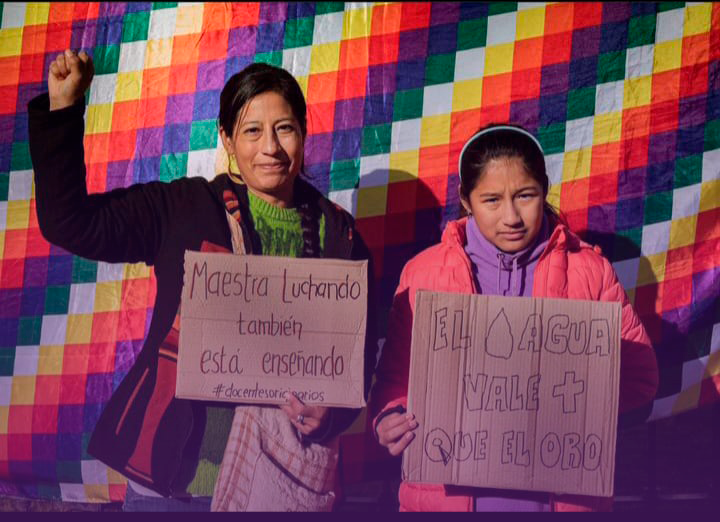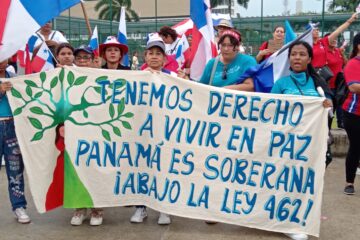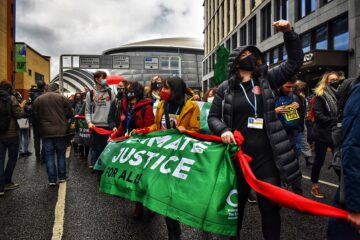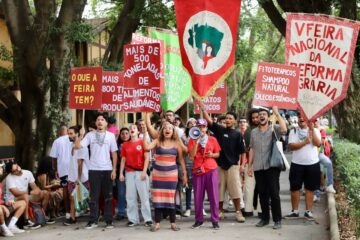Jujuy is the northernmost province of Argentina, on the border with Chile and Bolivia. It is currently ruled by the coalition of center and right-wing parties Together for Change [Juntos por el Cambio], in alliance with one of the hundred-year-old parties of Argentina, the Radical Civic Union [Unión Cívica Radical—UCR]. In Jujuy, people are starving and wages are miserable. This is why so many workers have joined the teachers’ and professors’ strike this time, including those working in basic education schools, high schools, and universities, as well as unions, the Educators’ Association of the Province [Asociación de Educadores Provinciales—ADEP] and the Center of Faculty of High Schools and Higher Education [Centro de Docentes de Enseñanza Media y Superior—CEDEMS].
On the first day of strike, June 5th, an assembly was held and decided that the mobilization would continue indefinitely. Most participants are women. The Association of State Workers [Asociación Trabajadores del Estado] joined the strike on the third day. Health care workers in hospitals called for a 72-hour strike to demand pay rises.
Since the beginning of the conflict, not a single day went buy without workers taking to the streets and holding a continuous assembly that has spread across the province.
For almost ten days, the social support has increased, day after day. The teachers that have massively taken to the streets are at the forefront of a people that is tired of seeing their rights violated.
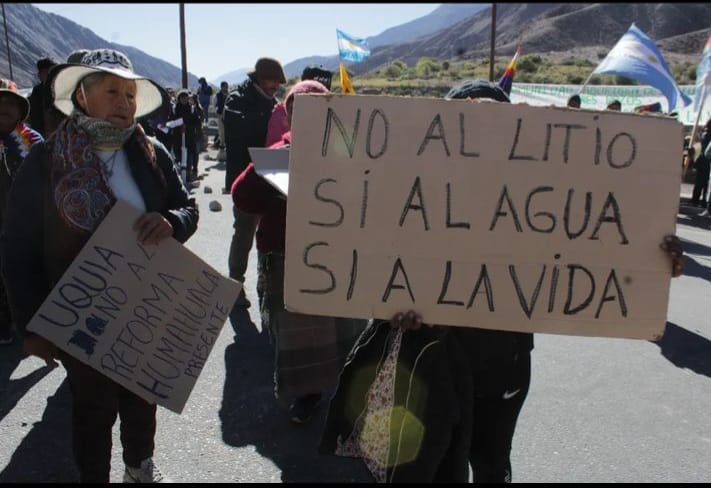
History of Repression
Ten days after Gerardo Morales took office as governor, in December 2016, he ordered the arrest of Milagro Sala, a leader of Túpac Amaru, the largest territory-based organization of the Jujuy province. Morales continuously persecutes this sector and does not miss a chance to express his support to the exploitation of natural resources and the handing over of resources to foreign sectors, and his opposition to social demonstrations. This is part of his campaign, as he aspires to run for president in October 2023. In the past eight years, there were few protests and mobilizations, and isolated incidents of union conflicts involving workers in education, mining, and the municipal public sector, among others.
After the pandemic, conflicts between state and workers and communities have increased. Repression as a response to struggles in the territories have also started to rise. Morales’ authoritarianism was also witnessed on March 8th, against the sisters that were demonstrating at the central square of the capital of the province, San Salvador de Jujuy, with the slogan “The debt is owed to women” [“La deuda es con nosotras”].
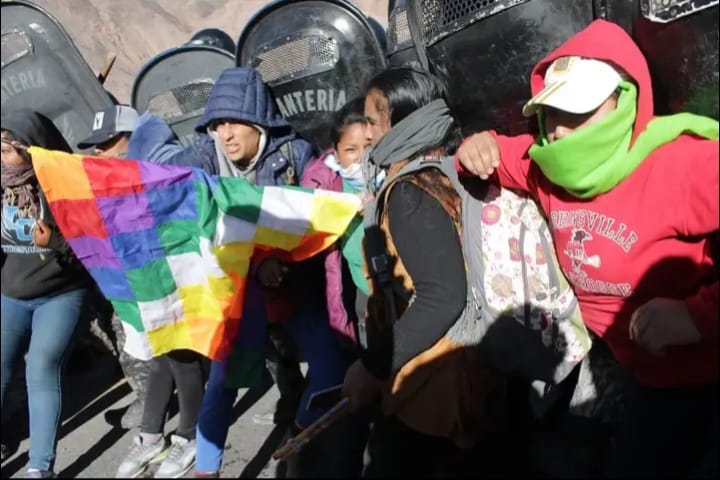
Against an Anti-Democratic Reform
Along with demands for pay rises, the mobilization also included in its agenda the repudiation of the Jujuy constitutional reform, discussed behind closed doors by the members of the local constituent committee. The two largest parties—Together for Change/UCR and the Justicialist Party [Partido Justicialista]—have the majority, and therefore did not even bother to introduce the proposed draft to guest speakers.
In mid-June, left-wing members and representatives of Kirchnerism withdrew from the committee, but the rest of the Justicialist Party have continued to endorse this illegitimate reform. On Thursday (15) night, they passed the reform, turning their backs to the people, while in San Salvador and cities across the province people held gigantic marches holding torches, a mark of Argentinian protests.
The repudiation of the reform has mobilized grassroots and middle-class sectors. Teachers and professors from the province, who had been on an indefinite strike, holding difficult wage negotiations, were the first to continue with the confrontation. They have been on the streets for longer. Nevertheless, as the content of the constitutional reform was revealed, other unions and organizations joined them.
Overall, the reform provides for power concentration in the hands of the Executive branch and affects Indigenous communities’ rights and collective rights, including the right to protest. Both in Jujuy and Salta, provinces that have passed laws banning the right to protest, there have been increasing conflicts, as extractivist activities expand, which may explain the lack of public debate and the rush to pass this reform.
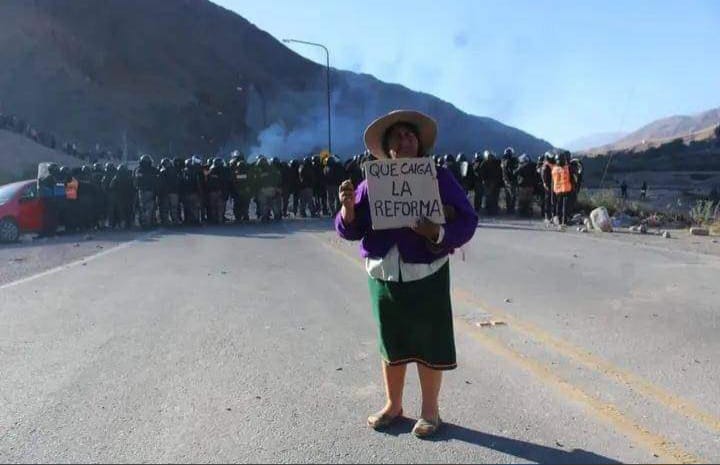
Who Is Currently Waging the Struggle in Jujuy
On Wednesday (14), Indigenous communities have decided to walk 210 kilometers from the city of Abra Pampa, in the mountainous region of Puna, to San Salvador. They marched facing extremely low temperatures and stopped to rest and sleep in the towns of Tilcara and Yala. They arrived on Friday morning and were welcomed by hundreds of teachers by the roads and in the city of San Salvador.
On Friday (16), an inter-union committee held a general strike joined by many. The population decided to gather massively in the capital of Jujuy, creating an over 15-block-long march, with songs, cultural and art performances, grassroots lyrics, and many instruments brought by music teachers.
On Tuesday (20), a multi-sector demonstration was held while the governor was introducing the reformed Constitution at a theater in the central area of the capital city. And there were more actions, including a nation-wide teachers’ strike called by the Confederation of Education Workers of the Argentinian Republic [Confederación de Trabajadores de la Educación de la República Argentina—CTERA], a nation-wide strike of public servants called by the ATE, and a nation-wide day of struggles by workers’ union centers, with mobilizations taking to the Jujuy Provincial House, the province’s official branch located in the capital city of the country, Buenos Aires.
The Workers’ Union Center of Argentina—Autonomous [Central de Trabajadores de Argentina – Autónoma—CTA Autónoma] issued an alert about the seriousness of the “attempts to use democratic institutions to restrict democracy. We do not want this, not in Jujuy or anywhere else.”
Road blocks have been created especially by Indigenous communities. Women are the main spokespersons of the demands. Over night, amid increasing lithium mining, the communities were faced with an article of the proposed local constitutional reform setting forth the immediate eviction of anyone who does not have a property title.
Protesters also include rural teachers, who for years have been demanding land titles and struggling against lithium mining and for protecting the water. Women from the villages, with their daughters and sons, are on the front lines of these gigantic mobilizations. The entire Jujuy population knows that lithium is a source of great wealth, but nearly any of that wealth gets to them. The mega economic projects belong to big transnational corporations that attack nature and the biodiversity of the mountains. Now, in addition to calling to overturn the constitutional reform, the mobilization is also demanding the resignation of Gerardo Morales.
Repression is brutal. The police have been shooting rubber bullets in the faces of demonstrators, a deplorable practice that had not been witnessed before in Argentina.
Moreover, they have illegally arrested more than 50 demonstrators; students, union leaders, members of parliament, lawyers, journalists, and other teachers were injured, beaten, or transferred without providing any information about them to their families.
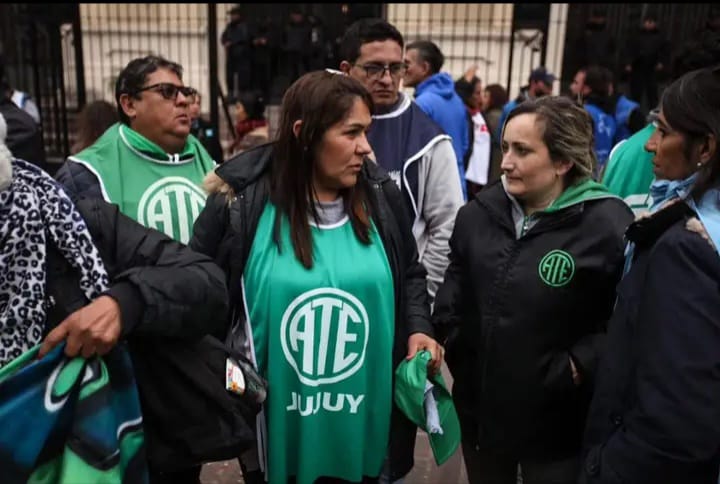
The Struggle Continues
The struggle will continue indefinitely, calling for better wages, garnering great support by citizens who endorse the teachers’ strike. While facing repression, the advances of the constitutional reform, the violation of the prior consultation, and the protest ban, the National Assembly of the Peoples of Puna has decided to indefinitely block all national routes that take to Chile and Bolivia. They will only lift the measure after the original constitution of the province is restored and the governor resigns.
National human rights organizations are also demanding that the reform is immediately lifted. The CTA Autónoma, the Feminist Inter-Union [Intersindical Feminista] and other grassroots organizations have signed a document stating that “there is no democracy if social protest is persecuted and stigmatized, because it is through it that the organized peoples have historically won their struggles and rights.” Protesting is not a crime! #JujuyResiste [#JujuyResist]

Alicia Raquel Coca is a member of the World March of Women Argentina and of the Workers’ Union Center of Argentina—Autonomous (CTA Autónoma).

